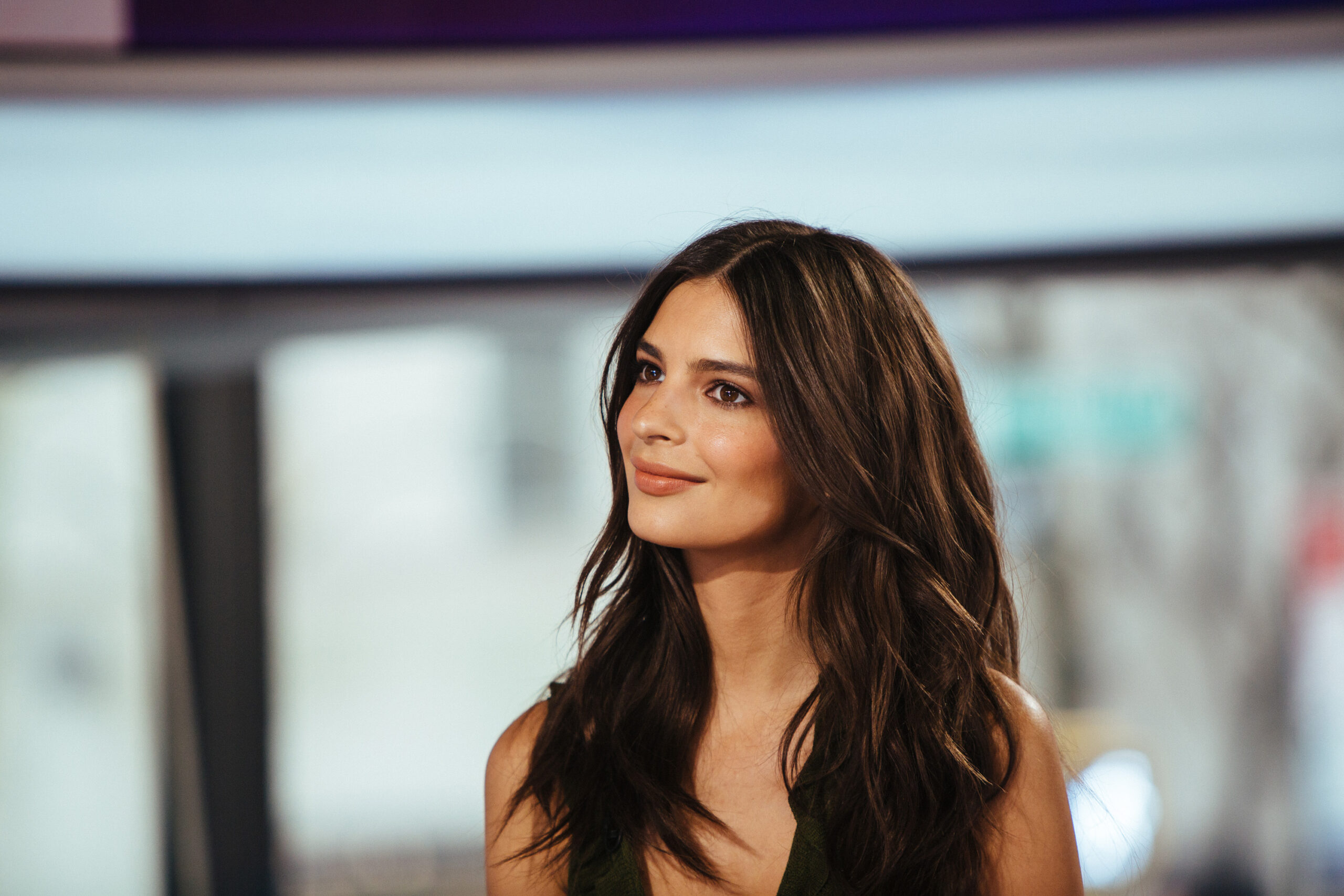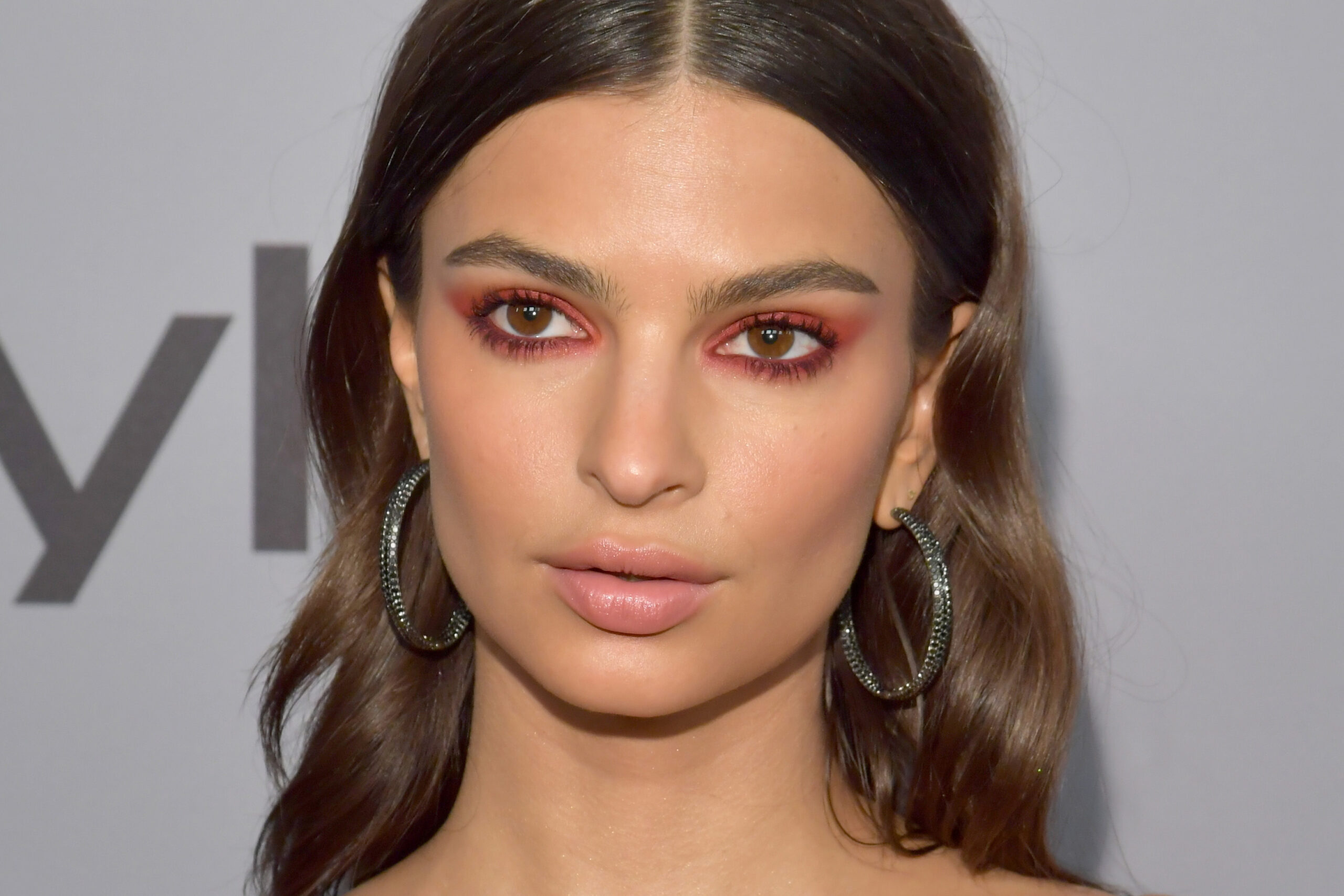Like most people, I first noticed Emily Ratajkowski in Robin Thicke’s Blurred Lines video, the uncensored version of which features her dancing naked except for a flesh-coloured G-string. Later, she played a busty schoolgirl in Gone Girl. Her career since has featured many half-naked Instagram pics. All of which is why Piers Morgan has written her off as a ‘global bimbo’, sniping that her feminism would make Emmeline Pankhurst turn in her grave.
It’s lucky, then, that I don’t judge women by what Piers Morgan thinks of them. Look harder, and there have always been clear signs that there’s far more to Emily than her body. She is politically engaged – supporting Bernie Sanders and a radical left; campaigning for Planned Parenthood. Her performance in upcoming ’80s-set romcom Cruise has been hailed as ‘superb’ by critics.
Emily is mid-shoot when I arrive. She is head-turningly beautiful – long limbs, delicate features, pooling brown eyes. As interesting, watching her, is how aware of her body she is, studying the photographer’s images, considering her angles, the jut of her hip. Before Emily, 27, was a model, she studied history of art. Now, she says – settling down, swaddled in a giant white robe – she enjoys the way Instagram allows her to marry curating and art-directing.
Are selfies art? “Yes!” she grins, “I think selfies have more to do with talking about gaze, especially for women. I don’t know if that is always art but they definitely engage in a conversation about the gaze – a new level of self-portrait.”
She hates art elitism, though. “The thing that made me not like the art world is snobbery and the bullshit,” she grins. “Art in every form should be about a visceral response.”
She is, of course, much smarter than many people (those who still find it confusing that a beautiful woman who enjoys her own body can also be intelligent) give her credit for. We meet in Paris, after her appointment as the face of Paco Rabanne’s new Pure XS For Her fragrance.
This is fitting because Emily shares both the sexy stylishness of Parisian girls and the philosophy of French feminists. She admires how Frenchwomen embrace their sexuality in a way that’s “never vulgar” or “obvious” because they always “have ownership of their bodies”. She is confident straddling the sexy-feminist dichotomy because she is the one defining the expression of her sexuality.
Her early experiences of the female body were formative. She studied art, taking life-drawing classes as a teen. On holidays in Europe she hung out on Spanish beaches surrounded by topless women. All of which gave her a natural appreciation of nudity “rather than making it always about sex”.
Still, as her own body developed, she was embarrassed to find it being policed. She recalls an incident when she was 13 – “I had quite a figure at that point, curvy with really big breasts” – when she wore a cute dress to a dance and was turned away for looking too sexy. “It was so embarrassing. I wasn’t having sex and didn’t know what being sexy was so it was very strange to get that kind of reaction. I felt like it was my fault although it wasn’t.”
Her mum went crazy, writing a letter saying, “You do not police my daughter just because she looks different…” Emily says, “Seeing her response to those things – never letting me feel guilty… the way she raged against people who told me how to dress, I think that’s why I have the attitude I do.” Her mother, an English academic, struggled as “a beautiful woman in an academic space and maybe being written off in that world. So when it came to me she was like, ‘You’re never going to feel bad about this.”‘
Emily thinks “sexuality should be fun”. And believes sexual freedom and social freedom are connected. “For me, feminism is all about choice: socially, sexually, in the workplace, in any capacity. It is about women having the freedom to choose.” Are there limits to that? “I don’t think so. Once you start drawing lines you’re missing the point, because everyone has different things they want for themselves… and there are no limitations for men in that way.”
What about pornography? “I have no issue with that… With the feminist revolution there was such an amazing conversation and then there was that split between, ‘Well if you’re a sex worker, you can’t be a feminist,’ or ‘If you’re a fan of pornography you can’t be feminist.’ I just don’t feel that way. I think if that makes a woman feel good it’s the same thing as a woman choosing to cover her face with a burka. If that’s her cultural influence and she feels empowered by it and satisfied with it, that’s up to her.” What’s essential, she thinks, is that “Women must feel liberated, not constrained, by feminism.”
When she filmed I Feel Pretty, she instantly bonded with its star, the comedian Amy Schumer, because they “have a lot of the same ideas about women… She is shocking. And the reason it’s so shocking is because, unfortunately, we’re not used to hearing women talk about sex in that way. It’s just smart and cool, liberating.”
I tell her I’ve heard she’s chosen her roles based on the Bechdel test, which measures whether a work features at least two women who talk to each other about something other than a man. She laughs. “I wish! Not many pass.” She feels real change won’t come to Hollywood until there are more women behind the scenes. “Right now, the executives and people really high up in Hollywood are white men,” but “that’s changing”, she thinks. She’s keen to produce. She loves Broad City (the sitcom about two 20-something female friends trying to ‘make it’ in New York) and would love to invest in a similar project.
Emily is uncomfortable with being a role model. She wants children but worries motherhood would mean setting an example. “I don’t want to be vanilla!” she says. “I think having haters is a good sign! I want to inspire people to get mad.” When I ask what she’s afraid of, she says “mediocrity”. “I would rather have 300,000 trolls than nobody saying anything.”
She recently married actor/producer Sebastian Bear-McClard, 31, after they dated for just four weeks because she “felt if I’m not going to get married when I’m this in love with someone then I don’t ever want to get married.” She walked the aisle in a yellow Zara suit. “It just felt like the most me outfit ever,” she grins. Yes, her wardrobe was a feminist statement.
No, she didn’t take his name. Although, she grins, “My family has been joking about him taking mine.”
Via our sister site Grazia.

